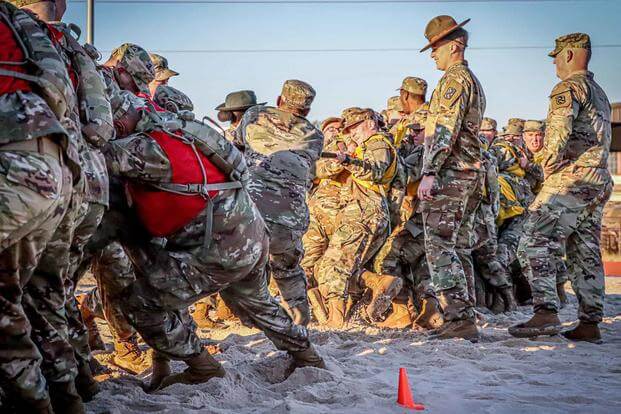Army recruits are getting injured at an alarming rate in basic training, costing the government millions of dollars to rehabilitate them or eventually pay them disability compensation, according to a study published in the Progress in Cardiovascular Diseases medical journal.
Researchers found that 34% of the Army's 99,335 trainees in 2017 sustained at least one musculoskeletal injury. Half of those injured were from eight states in the South, namely Louisiana, Mississippi, Alabama, Florida, Georgia, South Carolina, Tennessee and North Carolina.
Southern states contribute the most Army recruits compared to each state's general population of young adults, according to data from the Council on Foreign Relations.
Read Next: Space Force Done Testing the Fit on its Uniforms, Ending the Loose Pants Saga
Army planners in recent years have become increasingly concerned over new recruits' declining physical fitness. Participation in high school sports has dropped in recent years while childhood obesity rates have reached "epidemic levels," according to research from the National Library of Medicine. 17% of U.S. children are obese, the research found, a number that has been steadily rising for decades.
Nationally, the South has the highest prevalence of obesity, something researchers have attributed to a slew of factors including restrictions on access to health care, high-quality fitness facilities and healthy food. Large swaths of the South also have relatively low household incomes -- putting easy access to fitness training and healthy foods even further out of reach.
Army planners have long been concerned about musculoskeletal injuries, one of the main motivating factors in creating the Army Combat Fitness Test, or ACFT. Soldiers must pass the test every year to continue service, with high scores often enhancing promotion opportunities.
At the time the test was implemented, Sergeant Major of the Army Michael Grinston pitched it to the force partly as a means to reduce injuries, saying the ACFT's added complexity compared to the earlier Army Physical Fitness Test would force soldiers to train more with weights and add diversity to their workouts. The idea was that a stronger force would not be injured as easily.
But that would have little impact on basic training injuries, with new recruits coming straight from civilian life. Most enlistees come into the Army with little background in fitness, showing up without knowing how to do the exercises included in the fitness test, Staff Sgt. Krista Osborne, the Army's 2022 drill sergeant of the year, told Military.com in October.
Obesity is a key sticking point in the Army's recruiting troubles, with many possible applicants out of compliance with the service's body fat standards. Last year, the Army started a 90-day pre-basic training course for applicants up to 6% over the service's body fat limit. How much body fat a soldier can have varies, but the maximum is 20% for 17- to 20-year-old males and 30% for women in the same age group.
The pre-basic course goes over healthy eating and has applicants work out twice a day. Roughly 90% of those students graduate and move on to basic training. The Navy is starting a similar program.
Army leaders, particularly Gen. James McConville, the service's top officer, have routinely vowed not to lower any standards for service, though other branches are starting to retreat from previous fitness and body fat standards. The Air Force on Monday announced it is dramatically loosening body fat percentage restrictions, allowing up to 26% body fat for men from a precious threshold of 20%, and up to 36% for women from 30%.
-- Steve Beynon can be reached at Steve.Beynon@military.com. Follow him on Twitter @StevenBeynon.
Related: Less Screaming, More Weightlifting: The Army Is Reinventing Basic Training for Gen Z












